 On 23 Mar 1861, the first horse-drawn tramcars began service in London. Although similar operations had already been established in America, France and even Ireland, it took the effort of American entrepreneur George Francis Train to introduce them to London. (Image from 1875)
On 23 Mar 1861, the first horse-drawn tramcars began service in London. Although similar operations had already been established in America, France and even Ireland, it took the effort of American entrepreneur George Francis Train to introduce them to London. (Image from 1875)
Before starting, he needed consent from officials to put iron rails into some London streets. These reduce friction, and make it far easier for a horse to pull many passengers on a carriage with flanged wheels. As with any new idea that threatens the livelihoods of those operating in the old way (here, with the horse-drawn road omnibus) he met with opposition.
In 1860, Train published a 59-page booklet describing the merits of the tramcar. It included articles from newspapers expressing different opinions. You can read an extract from his appeal, addressed to the President of the Board of Trade, London, and gain a sense of what it took to establish this new form of transport. Train titled his booklet Observations on Horse Railways.

On 23 Mar 1769, William Smith was born, an English engineer and geologist who traveled the entire country to verify that relationships between the strata and their characteristics were consistent everywhere. He created a great geologic map of England and Wales (1815) set the standard for modern geologic maps.
Today's book pick is: The Map That Changed the World: William Smith and the Birth of Modern Geology, by Simon Winchester. This author has published several engrossing popular biographies, including the best-selling The Professor and the Madman. The writer’s strength is his ability to meld into compelling narrative a host of literary conventions, such as foreshadowing and fictionalized, internal dialogue. Instead of what might be an otherwise dry reading, such a lot of life is injected that his books are gripping. He presents a very human tale of endurance and achievement, of one man’s dedication in the face of ruin.
It is available from Amazon, typically about New from $6.60. Used from $2.32. (As of earlier time of writing - subject to change.)
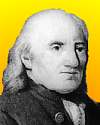
On 23 March 1699, John Bartram was born, an American explorer who is regarded as the father of American botany. He had a Quaker schooling, pursued his interest in botany, ecology, and better methods of farming. He became George III’s botanist for North America, and was a friend of Benjamin Franklin, and a co-founder of the American Philosophical Society. The Bartram's Garden that he created is now part of Philadelphia's small park system. It is the oldest living botanical garden in the U.S., where many giant trees may still be seen that he planted. Today's book pick is: , by , who enthuse you with the genuine passion that Bartram had to learn about and discover new botanical plants.
It is available from Amazon, typically about (As of earlier time of writing - subject to change.)
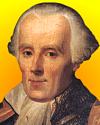 | All the effects of Nature are only the mathematical consequences of a small number of immutable laws. |
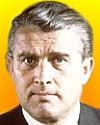 | Our two greatest problems are gravity and paperwork. We can lick gravity, but sometimes the paperwork is overwhelming. |
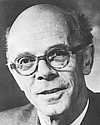 | An egg is a chemical process, but it is not a mere chemical process. It is one that is going places—even when, in our world of chance and contingency, it ends up in an omelet and not in a chicken. Though it surely be a chemical process, we cannot understand it adequately without knowing the kind of chicken it has the power to become. |
| Before you look at today's web page, see if you can answer some of these questions about the events that happened on this day. Some of the names are very familiar. Others will likely stump you. Tickle your curiosity with these questions, then check your answers on today's web page. | |
| Births | |
 | On 23 Mar 1912, Wernher von Braun was born. His interest in rockets began as a teenager. He served in the German war effort providing technological advances. After Germany was defeated in World War II, he left his native land and spent the rest of his life contributing his talents to development of American rockets. He eventually become director of NASA’s Marshall Space Flight Center, and was chief architect of the Saturn V launch vehicle used to put men on the moon. During World War II, he led the development of which notorious war weapon for the Nazis? |
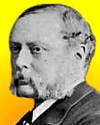 | Richard Anthony Proctor, born 23 Mar 1837, was an English astronomer who in 1873 was the first to suggest that lunar craters were the result of meteor impacts. What had previously been assumed to be the source of lunar craters before Proctor’s proposal? |
| Deaths | |
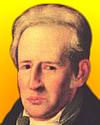 | Andrés Manuel Del Rio (1764-1849) discovered a new element (1801). While a professor of mineralogy in Mexico, Del Rio examined a specimen of brown lead from Zimapan and found a new metal, similar to chromium and uranium, which he name erythronium, after the red colour of one of its chemical compounds (Greek erythros, “red”). He was dissuaded by other chemists, and eventually regarded it as impure chromium. Swedish chemist Nils Gabriel Sefström, rediscovered the element (1830) and named it after the Scandinavian goddess of beauty, because of its beautiful multi-coloured compounds. What is the name of this element? |
| Events | |
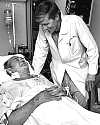 | On 23 Mar of a certain year, Dr. Barney C. Clark who had been the first recipient of a permanent artificial heart, died at the University of Utah’s Medical Center after 112 days with the device. In which decade was the first human permanent artificial heart implanted? |
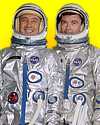 | On 23 Mar 1965, America’s first two-person space flight blasted off from Cape Kennedy with astronauts Virgil I. Grissom and John W. Young aboard. What was the name of their spacecraft? |
Fast answers for the previous newsletter for March 22: cosmic rays • Cambrian • paddle-wheel • the decade including the year 1960 • France.
 If you enjoy this newsletter, the website, or wish to offer encouragement or ideas, please send feedback by using your mail reader Reply button.
If you enjoy this newsletter, the website, or wish to offer encouragement or ideas, please send feedback by using your mail reader Reply button. Your click on a Facebook, StumbleUpon, or other social button on the site webpages is also a welcome sign of appreciation. Thank you for using them.
© This newsletter is copyright 2020 by todayinsci.com. Please respect the Webmaster's wishes and do not put copies online of the Newsletter — or any Today in Science History webpage. (If you already have done so, please remove them. Thank you.) Offline use in education is encouraged such as a printout on a bulletin board, or projected for classroom viewing. Online, descriptive links to our pages are welcomed, as these will provide a reader with the most recent revisions, additions and/or corrections of a webpage. For any other copyright questions, please contact the Webmaster by using your mail reader Reply button.
--
If you do not want to receive any more newsletters, Unsubscribe
To update your preferences and to unsubscribe visit this link
Executive Real Estate Business Class
-
"It was like a man with wings. It wasn't like anything you'd see on TV or in a monster movie." ...
About the publisher
Search This Blog
Blog Archive
-
▼
2021
(585)
-
▼
March
(44)
- Newsletter for Wednesday 31 March.
- On This Day for March 30 - Failed assassination at...
- Newsletter for Tuesday 30 March.
- On This Day for March 29 - Dominion of Canada crea...
- Newsletter for Monday 29 March.
- The real history behind new film 'Ammonite', starr...
- On This Day for March 28 - Constantinople renamed ...
- Newsletter for Sunday 28 March.
- On This Day for March 27 - Cleopatra reinstated as...
- Newsletter for Saturday 27 March.
- Catch a break with spring savings
- On This Day for March 26 - Signing of Israel-Egypt...
- Newsletter for Friday 26 March.
- On This Day for March 25 - Robert the Bruce crowne...
- On This Day for March 24 - Exxon Valdez Alaskan oi...
- Newsletter for Wednesday 24 March.
- On This Day for March 23 - Lewis and Clark's retur...
- Newsletter for Tuesday 23 March.
- On This Day for March 22 - Murder at Jamestown, Ya...
- Newsletter for Monday 22 March.
- Roman medicine: 6 ways people stayed healthy
- On This Day for March 21 - Closing of Alcatraz pri...
- Newsletter for Sunday 21 March.
- On This Day for March 20 - AUM subway attack, Maud...
- Newsletter for Saturday 20 March.
- On This Day for March 19 - Iraq War begins, Glenn ...
- Newsletter for Friday 19 March.
- On This Day for March 18 - Election of Chen Shui-b...
- On This Day for March 17 - Vote to end apartheid, ...
- On This Day for March 16 - My Lai Massacre, Caroli...
- On This Day for March 15 - Julius Caesar assassina...
- On This Day for March 14 - Reelection of Vladimir ...
- Newsletter for Sunday 14 March.
- On This Day for March 13 - The planet Uranus disco...
- Newsletter for Saturday 13 March.
- Newsletter for Friday 12 March.
- Newsletter for Thursday 11 March.
- Newsletter for Wednesday 10 March.
- On This Day for March 9 - Battle of the Monitor an...
- Newsletter for Monday 8 March.
- Newsletter for Sunday 7 March.
- On This Day for March 6 - King Tut's tomb opened, ...
- On This Day for March 2 - Moroccan independence de...
- On This Day for March 1 - Establishment of Yellows...
-
▼
March
(44)
-
Blogroll
-
About
HistoryFact










0 comments:
Post a Comment